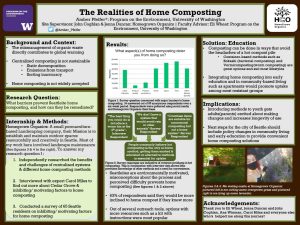The Realities of Home Composting
People in Seattle utilize city composting to greenly dispose of organic waste. Although this is better than landfilling, it is not as sustainable as publicly thought. The unprecedented speed of global warming shows a necessity for us to be living the most sustainable ways possible, now, and not later. The purpose of this study was to discover what inhibits home composting and to illuminate new methods to the public eye. To do this, I researched several home composting methods that would appeal to different lifestyles, as well as the challenges of city composting. I then held an interview with a compost expert and launched a survey to Seattle residents; to collect information on what people were gaining from city composting that they otherwise lacked in home composting. I found that many people thought city composting to be more sustainable than home composting, because they felt they could compost more diverse material. I also found that most were resistant to home composting because they only knew of hot composting methods, which are labor intensive and can attract pests. This shows a need for education on different methods as well as dispersion of resources to make the switch easier, more likely, and longer lasting. For these changes to be well received and have the farthest reach possible, a government program to implement container based composting at the household level and hot composting at the neighborhood or community level would have the most impact on emissions reduction, and take-up of this sustainable behavior.
